There's a rather succinct answer to the question we're considering. That answer is "yes." You can be a social smoker but it's unlikely to remain just a social habit for long. Plus, any amount of smoking is unhealthy. Although social smoking has increased 40 percent between 1998 and 2001, it's still a vague term [source: Social Smokers]. What exactly is a social smoker, or non-daily smoker? There are a few defining characteristics:
- Social smokers don't smoke on a daily basis.
- They usually smoke only in the evening and/or in social settings.
- They don't smoke alone.
- They rarely buy cigarettes.
- Going without cigarettes doesn't produce withdrawal symptoms.
- They don't smoke more than a pack a week.
- Their amount of smoking doesn't consistently increase.
Up to 40 percent of U.S. adults who have smoked in the past month aren't considered nicotine dependent, according to the National Survey on Drug Use and Health [source: Health.com]. Consequently, there's a group of individuals that are physically able to smoke socially, just as there are people capable of drinking socially without becoming alcoholics. Yet habitual addiction is still possible. For instance, THC (the chemical in marijuana) is not chemically addictive, certainly not in the way nicotine is. Yet plenty of pot-smokers are habitually addicted to the ritual of getting high, alone or with friends [source: United Health Services]. Similarly, while a social smoker may not be chemically dependent on cigarettes, they may still crave them occasionally. So can it be considered an occasional indulgence, not unlike binging on sweets or getting a little drunk?
Advertisement
Advertisement

